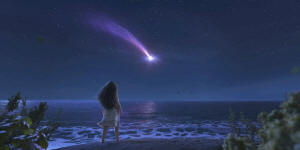Disney didn't copy 'Moana' from a man's story of a surfer boy, a jury
says
[March 11, 2025]
By ANDREW DALTON
LOS ANGELES (AP) — A jury on Monday quickly and completely rejected a
man’s claim that Disney’s “Moana” was stolen from his story of a young
surfer in Hawaii.
The Los Angeles federal jury deliberated for only about 2 ˝ hours before
deciding that the creators of “Moana” never had access to writer and
animator Buck Woodall’s outlines and script for “Bucky the Surfer Boy.”
With that question settled, the jury of six women and two men didn’t
even have to consider the similarities between “Bucky” and Disney’s 2016
hit animated film about a questing Polynesian princess.
Woodall had shared his work with a distant relative, who worked for a
different company on the Disney lot, but the woman testified during the
two-week trial that she never showed it to anyone at Disney.
“Obviously we’re disappointed,” Woodall's attorney Gustavo Lage said
outside court. “We’re going to review our options and think about the
best path forward.”
In closing arguments earlier Monday, Woodall's attorney said that a long
chain of circumstantial evidence showed the two works were inseparable.
“There was no ‘Moana’ without ‘Bucky,’” Lage said.

Defense lawyer Moez Kaba said that the evidence showed overwhelmingly
that “Moana” was clearly the creation and “crowning achievement” of the
40-year career of John Musker and Ron Clements, the writers and
directors behind 1989's “The Little Mermaid,” 1992's “Aladdin,” 1997's
”Hercules” and 2009's “The Princess and the Frog.”
“They had no idea about Bucky,” Kaba said in his closing. “They had
never seen it, never heard of it.”
“Moana” earned nearly $700 million at the global box office.
A judge previously ruled that Woodall’s 2020 lawsuit came too late for
him to claim a piece of those receipts, and that a lawsuit he filed
earlier this year over “Moana 2” — which earned more than $1 billion —
must be decided separately. That suit remains active, though the jury's
decision does not bode well for it. Judge Consuelo B. Marshall, who is
also overseeing the sequel lawsuit, said after the verdict that she
agreed with the jurors' decision about access.
“We are incredibly proud of the collective work that went into the
making of Moana and are pleased that the jury found it had nothing to do
with Plaintiff’s works,” Disney said in a statement.
Musker and Disney's attorneys declined to comment outside the courtroom.
The relatively young jury of six women and two men watched “Moana” in
its entirety in the courtroom. They considered a story outline that
Woodall created for “Bucky” in 2003, along with a 2008 update and a 2011
script.
In the latter versions of the story, the title character, vacationing in
Hawaii with his parents, befriends a group of Native Hawaiian youth and
goes on a quest that includes time travel to the ancient islands and
interactions with demigods to save a sacred site from a developer.

[to top of second column]
|

This image released by Disney shows the character Moana, voiced by
Auli'i Cravalho, in a scene from "Moana 2." (Disney via AP)
 Around 2004, Woodall gave the
“Bucky” outline to the stepsister of his brother's wife. That woman,
Jenny Marchick, worked for Mandeville Films, a company that had a
contract with Disney and was located on the Disney lot. He sent her
follow-up materials through the years. He testified that he was
stunned when he saw “Moana” in 2016 and saw so many of his ideas.
Along with her testimony saying she didn't show “Bucky” to anyone,
messages shared by the defense showed she eventually ignored
Woodall's queries to her and had told him there was nothing she
could do for him.
Disney attorney Kaba argued there was no evidence Marchick ever
worked on “Moana” or received any credit or compensation for it.
Kaba pointed out that Marchick, now head of features development at
DreamWorks Animation, worked for key Disney competitors Sony and Fox
during much of the time she was allegedly making use of Woodall's
work for Disney.
Woodall also submitted the script directly to Disney and had a
meeting with an assistant at the Disney Channel, which Marchick
arranged for him, to talk about working as an animator. But jurors
agreed that this didn't give them reason to believe that “Bucky”
made its way to Musker, Clements or their collaborators.
Lage, Woodall's attorney, outlined some of the similarities of the
two works in his closing.
Both include teens on oceanic quests.
Both have Polynesian demigods as central figures and shape-shifting
characters who turn into, among other things, insects and sharks.
In both, the main characters interact with animals who act as spirit
helpers.
Kaba said many of these elements, including Polynesian lore and
basic “staples of literature,” are not copyrightable.

Shape-shifting among supernatural characters, he said, appears
throughout films including “The Little Mermaid,” “Aladdin,” and
Hercules, which made Musker and Clements essential to the Disney
renaissance of the 1990s and made Disney a global powerhouse.
Animal guides go back to movies as early as 1940's “Pinocchio” and
appear in all of Musker and Clements’ previous films, he said.
Kaba said Musker and Clements developed “Moana” the same way they
did the other films, through their own inspiration, research, travel
and creativity.
The lawyer said thousands of pages of development documents showed
every step of Musker and Clements' creation, whose spark came from
the paintings of Paul Gaugin and the writings of Herman Melville
“You can see every single fingerprint,” Kaba said. “You can see the
entire genetic makeup of ‘Moana.’”
All contents © copyright 2025 Associated Press. All rights reserved |